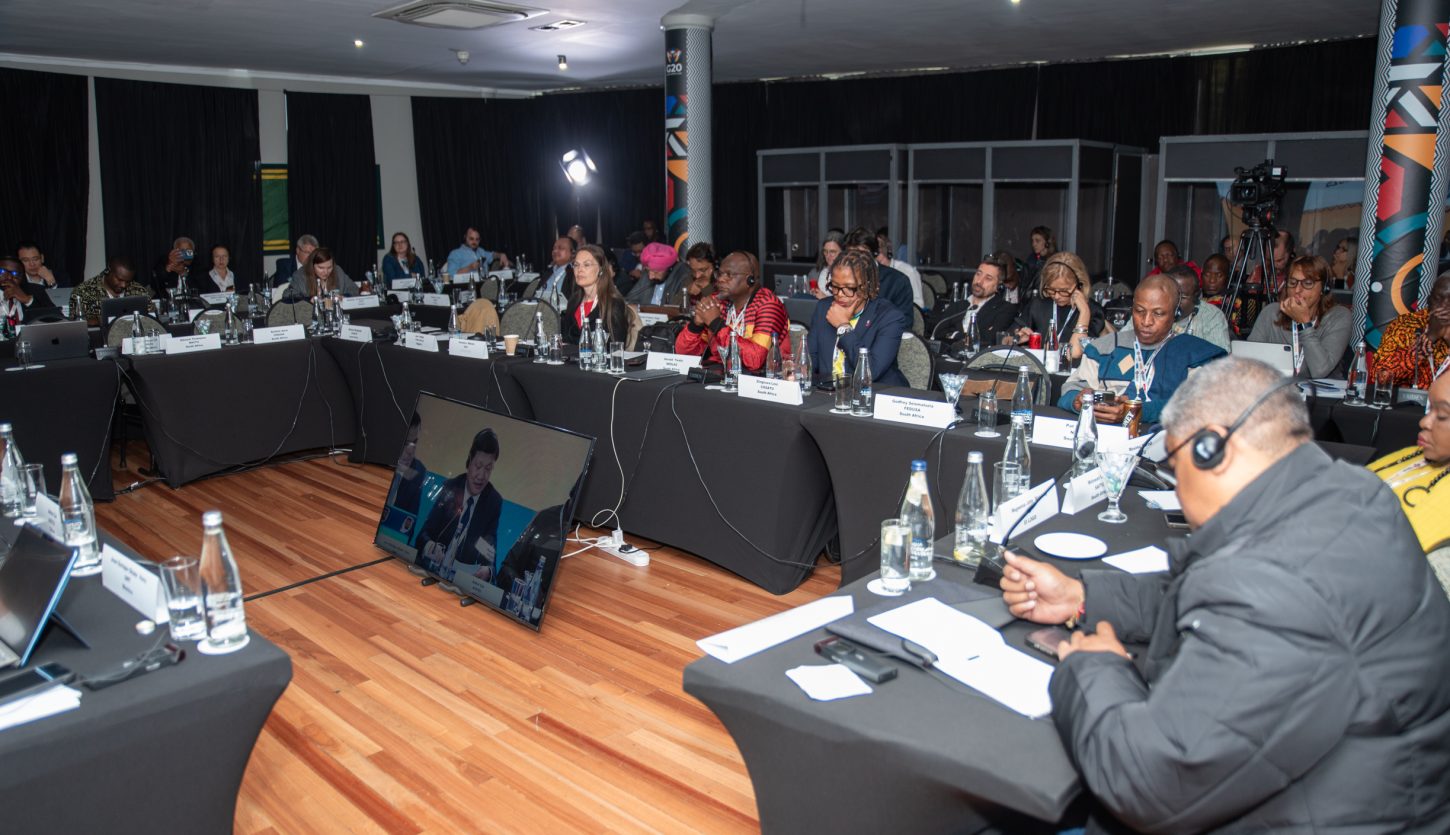L20 members met in George, South Africa, on 28-29 July, under the theme: “Fostering Solidarity, Equality and Sustainability through a New Social Contract”.
Trade union leaders from G20 countries and beyond, discussed trade union priorities to advance industrial policy and a Just Transition; the impact of trade conflicts on workers; labour rights, informality and precarious work; taxation and debt; geopolitical challenges; digitalisation and AI.
The L20 Summit culminated in a dialogue session between the L20 and heads of delegations to the G20 Labour and Employment Ministers’ Meeting (LEMM), to discuss joint approaches to fighting inequalities, fostering real wage growth and increasing the labour income share of GDP.
The session was moderated by ITUC General Secretary, Luc Triangle and included the South African Deputy Minister of Employment, the UK Minister of State for Work and Pensions, the German State Secretary of Labour, and the French Delegate to the ILO and representative to the G20, as well as the ILO Director General.
Participants showcased how they have been advancing decent work, wage policies and initiatives to build a better social contract. The importance of G20 commitments on women’s participation in the labour force and further advancing progress on Not in Education, Employment or Training (NEET) rates were emphasised, as well as the key role of living wages, decent work and strong social protection in the fight against inequalities and obtaining a fair share of income for workers. Trade unions described what real inequality looks like and emphasised the need to advance concrete actions.
At the conclusion of the summit, the L20 issued this statement on A Worker-Centred Agenda for Global Equity and Justice.
Labour and Employment Ministers’ Meeting
An L20 delegation attended the G20 LEMM, on 30-31 July, and voiced the trade union priorities from the L20 Summit:
Luc Triangle stated:
“All of us here – trade unions and governments – have the same responsibility: to respond immediately to workers’ everyday problems, to give them the means to take themselves out of poverty, out of informality, precariousness and ensure decent work and decent lives for all."
"Strong unions are a key for ensuring that these policies support the livelihoods of workers. Moreover, strong social dialogue and collective bargaining are essential tools to uphold these policies and guarantee their effectiveness and sustainability.”
The President of the Congress of South African Trade Unions (COSATU) Zingiswa Losi added:
“Reducing inequality is a shared responsibility. Decent job creation, social dialogue, collective bargaining and living wages are proven pathways to more just and equitable societies.”
The LEMM closed with the presentation of the Joint L20-B20 Statement and the adoption of the G20 Labour and Employment Ministerial Declaration.
G20 Labour and Employment Ministerial Declaration
Trade unions welcomed the adoption of the G20 Labour and Employment Ministerial Declaration that includes a reaffirmation of commitments to advancing decent work and quality jobs and policy priorities to reduce inequalities in the world of work. It recognises the importance of strengthening social protection and emphasises the importance of protecting labour rights and effective social dialogue.
G20 Ministers committed to improving the quality, reach and responsiveness of national youth employment strategies and to strengthen education-to-work transitions through investment in quality TVET (Technical, Vocational and Educational Training), apprenticeships, in-work learning and upskilling/reskilling.
Ministers adopted the Nelson Mandela Bay G20 Youth Target, to reduce NEET among 15–29 year-olds by a further 5 per cent by 2030 and the Brisbane–EThekwini Goal, which extends their commitment to reduce the gender gap in labour force participation by 25% by 2030.
They also committed to progressively reduce the gender wage gap and to advance equal pay for work of equal value, encouraging G20 countries to work towards reducing the gender wage gap by 15% by 2035, with a view to reviewing this ambition after five years to increase this commitment to 35% by 2035.
Trade unions welcomed the recognition by Ministers of the importance of freedom of association, collective bargaining and tripartite social dialogue as well as supporting responsible business conduct and transparency in global supply chains, and promoting due diligence efforts and protections.
The General Secretary of the Trade Union Advisory Committee to the OECD (TUAC) Veronica Nilsson concluded:
“It is positive that the ministerial declaration included commitments to promoting wage-setting mechanisms and wage protection policies, and recognised the importance of adequate statutory or collectively negotiated minimum wages in addressing inadequate pay and low wages."
"However, we regret that the declaration failed to include a strong reference to living wages - wages sufficient to cover actual living costs for workers - despite their crucial importance as a tool for reducing inequalities and advancing social justice."

